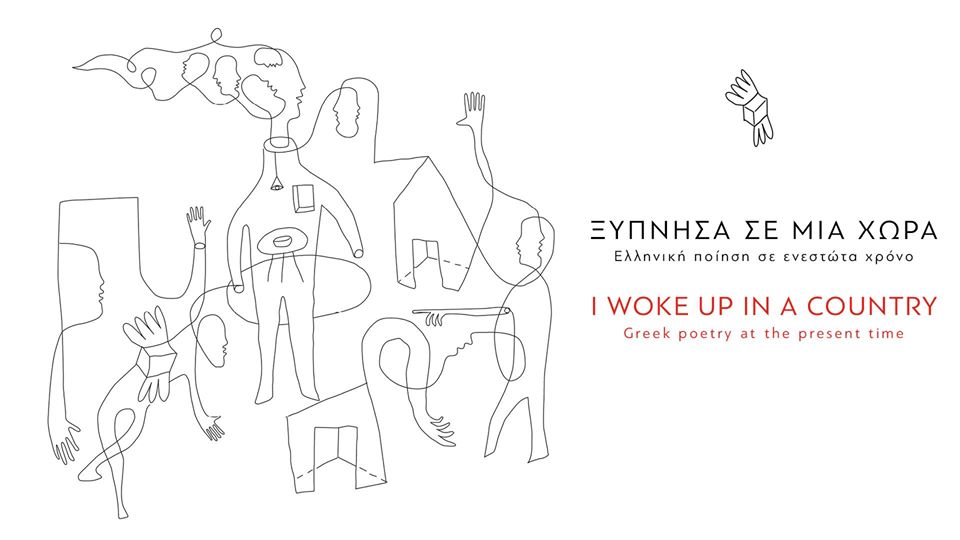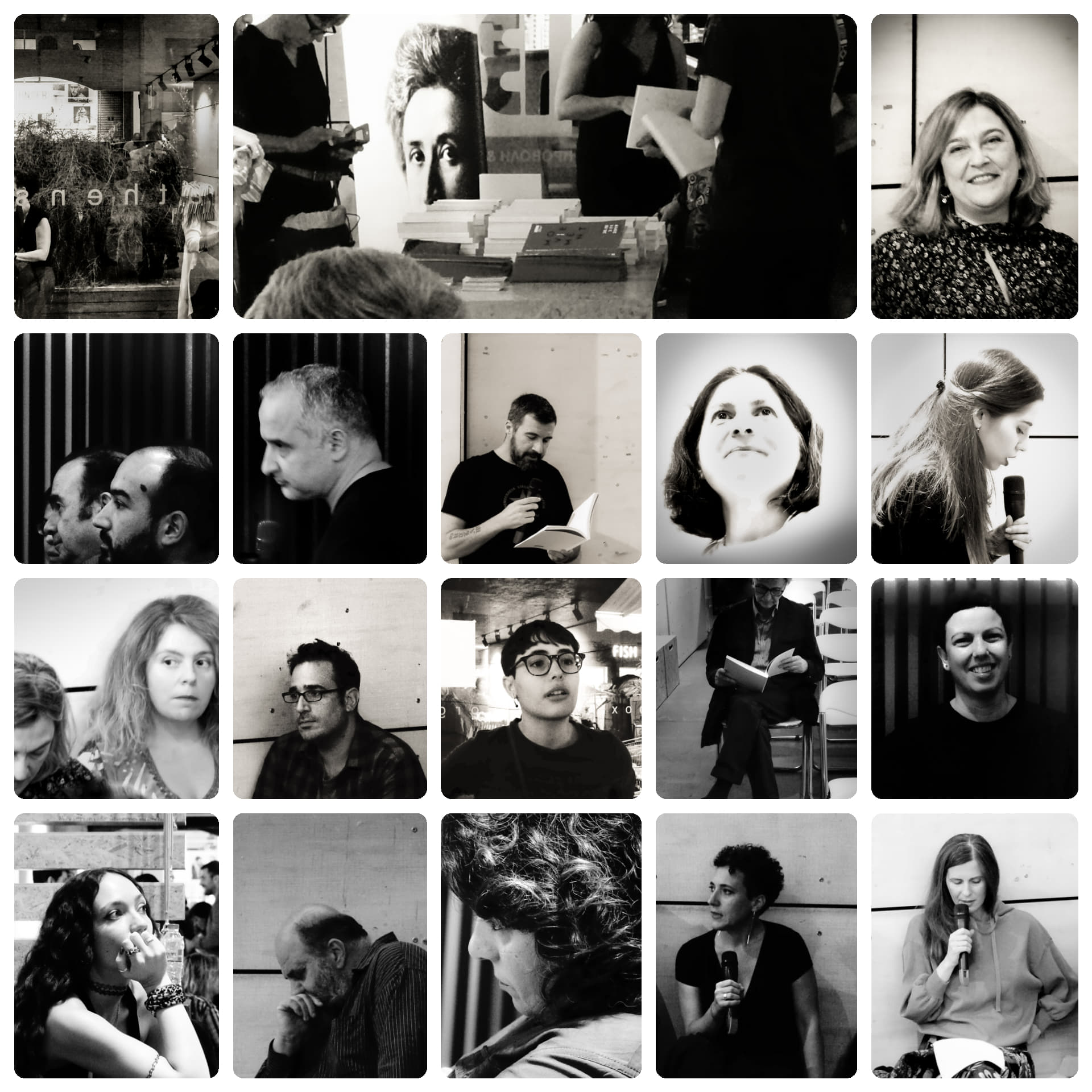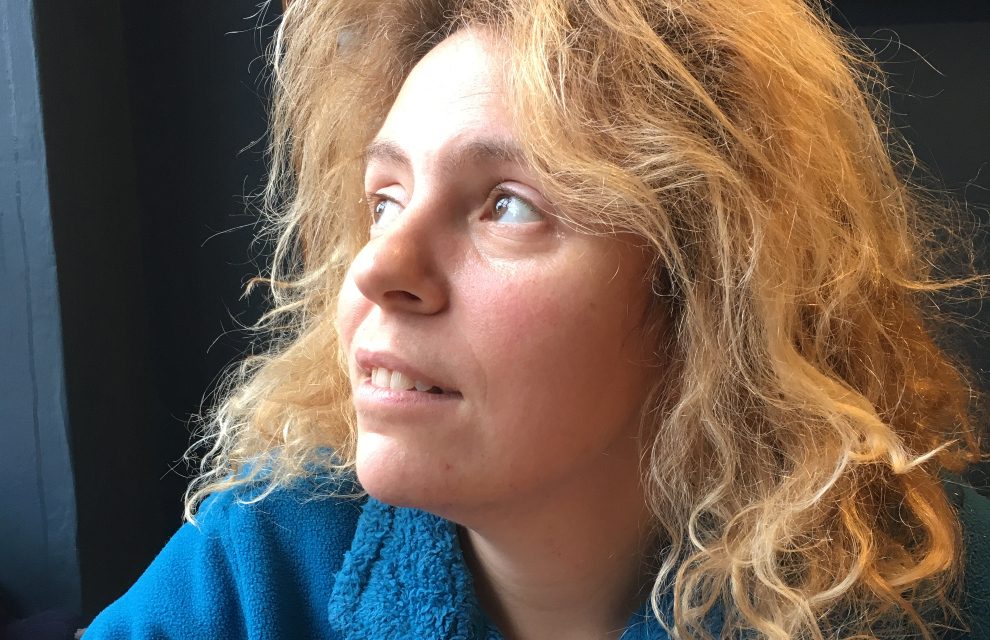Christiana Mygdali is a linguist and translator. She holds a DPhil from the University of Oxford on translation as a mechanism of cultural resistance under the Junta in Greece. Since 2006, she has been teaching language, literature, translation theory and adaptation at Universities and has collaborated with various private and public institutions, both in Greece and in the UK. She has also published a large number of translations. She works with reading as a form of therapy and is interested in cultural practices holding together human communities.
Christiana Mygdali spoke to Reading Greece* on the occasion of translating the recently published bilingual anthology I woke up in a country: Greek poetry at the present time, commenting on the main challenges she was confronted with. Asked about the current poetic production in Greece, she comment that “studying the network of poets – and intellectuals in general – at any given time in a certain country, can give us alternative insight into the history of ideas“. She also discusses the role and responsibilities of a translator and whether translation can ever be unethical, and concludes that “translation, both as an act and as a gesture, can show everyone how important exchange of ideas can be in crucial times, recording, at the same time, one of the most interesting areas of Greek history as it goes“.
You are the translator of the recently published bilingual anthology I woke up in a country: Greek poetry at the present time. Tell us a few things about the book and the experience of translating the poems included in the anthology.
As a translator with a background in cultural studies, I have always regarded anthologies as a form of translation per se. The very act of selecting texts in order to compose an anthology constitutes a powerful gesture from the part of the editors, who, according to both their intentions and their aesthetics, translate the vast literary production into a manageable corpus of texts that are representative of a genre, an era, a literary trend etc. The anthology I woke up in a country is a great example of such a gesture, as it is an anthology of poems written around the same time in Greece. The fact that it came out of a competition makes it even more timely. Moreover, being bilingual, the anthology provides a non-Greek speaking readership with an access to contemporary Greek poetry. Therefore, it has been an immense privilege to have been selected as its translator, no matter how challenging the project was.
Which were the main challenges you were faced with while translating the poems of fifty different poets? How did you deal with them?
I would like to thank you for bringing up this issue, as it was actually the core of the two main challenges that I was confronted with, as I was working towards the completion of this project. Firstly, the poems that I had to translate were short fragments of each poet’s work, previously unpublished. Therefore, there was no context for me to refer to when trying to grasp the subtle meanings of each poem. Secondly, these translations were intended to be the organic parts of a collective volume, and I had to make sure that the final version of my translations would both respect the individuality of each work and make sense as a new corpus.
In order to meet the first challenge, I tried to get accustomed with each poet’s style, by reading more of their works, and I gave as much time as possible between translating each individual’s work. Most importantly though, I decided to establish communication with each poet, making sure that they would have seen and approved of the final versions of their poems in translation. In some cases, this communication started quite early in the process, as I had specific questions to ask in order to make translation choices. Most of the translations though were only shared with their authors a few weeks before publication, just to make sure that they all had a final say on their work. All poets were willing to engage in a creative conversation about translation, even those who declared not to have a great command of the English language. Their comments proved extremely helpful at times; I would like to take this opportunity to thank them all, because they facilitated my role in every possible way.
For the second challenge, I had to primarily trust my instinct about what constitutes a solid collective work. Then, I revisited a number of anthologies, especially of Greek poetry, published at various times, by various institutions, serving different purposes each time. Finally, I had to turn to the editors of the anthology for advice when needed. Their feedback has been extremely valuable, as they offered me an overview of the selected material, the concept of the competition, and the actual purposes of the anthology. I believe that the final product is representative of everyone’s diligence, engagement and faith to the process, and I feel very honored to have collaborated in this collective project.

To use Karn Van Dyck’s words, “what most distinguishes the poetry of this new millennium from that which came before is, on the one hand, its diversity – there are no clear-cut schools or factions – and, on the other hand, the cultural conditions that it takes for granted”. How would you comment on current poetic expression in Greece?
Poetry as a genre is all about making, that is constructing things from scratch, using perhaps materials available and already used, but always aiming at new directions. In that sense, this is a very poetic moment for Greek creators. Greece has been deconstructed in all possible ways during the last ten years: very early on within the so-called socioeconomic crisis, a young generation of poets started gathering together in order to read their poems to each other, and understand collectively the major changes the country was going through. I can trace the beginnings of this tendency at the events organized at ‘Attis’ theatre, under the auspices of Thodoros Terzopoulos – representing the previous generation of intellectuals. Then, the phenomenon took various forms and a number of poetic groups were shaped within this first gathering and spread their activities, mainly poetry readings and sociopolitical discussions from houses in Athens to public venues, such as bookshops, café bars and institutions. In my opinion, even though this is not indicative of a certain trend, it certainly allows us to observe a visible gathering of young Greek poets, who are active under the specific sociopolitical circumstances Greece is undergoing right now.
Another interesting characteristic of Greek poetry today is the fact that there is a significant corpus of poems written in Greek by poets whose native language is not Greek. However few they may be, I believe it is worth studying their works, looking at how they use the language, if they incorporate elements of their poetic tradition in their poetry, and how they actually position themselves within the Greek literary system.
In my opinion, studying the network of poets –and intellectuals in general- at any given time in a certain country, can give us alternative insight into the history of ideas, and this very moment of Greek history is very crucial and totally worth recording in all possible aspects.
Most scholars reckon that the content of a book cannot be separated from the particularities of the language that gave it shape. In this context, where does the role and responsibility of the translator lie?
Language is a universal code, and, despite the fact that there may be cultural or timely nuances that have only been expressed in one language, there is always a way for the translator who understands fairly well the cultures of both the source and the target language to communicate these subtle linguistic particularities to those readers of the translation who cannot access the original. Most of the times, there are ways to manage this in the translated text; however, there are a few occasions where the only way to explain what is meant in the original text is by adding notes.
Overall, what each and every translator needs to constantly keep in mind, is the fact that translation is a rewriting, and, as such it should be treated, i.e., with respect to the source, but also with a clear intention to mediate the ideas expressed in the original text, and to make sure that the message is conveyed intact to the readers of the translation. Language is part of the message, so, if a level of foreignization is necessary in order to indicate stylistic characteristics innate to the original text, the translator should meet this challenge and dare to offer a translation that does not just flow, but in which the ideas can run smoothly.

Renowned translator Karen Emmerich has claimed that when translating from a so-called “minor” to a so-called “major” language or literature, translators do sometimes hold remarkable power, including the power to produce what will in many cases become the only interpretation of a work of literature available in a given language. How do you respond to this power? Can translation ever be unethical?
The responsibility of the translator, in my opinion, is always huge, no matter how large or small number of native speakers the language from which he is translating holds. Not so much because this may be the only access available to those who do not read the original language –which is of course worth taking into account- but also because the translator is responsible for the destiny of the text version he proposes, and that is always unpredictable. To give you only an example from the anthology, I was asked last week whether my translation of a poem included in the volume can be used as lyrics for a song. I gladly accepted, and felt that this was the best reward I could have ever imagined for the effort I made in order to preserve the music and the inner rhythm of each poem.
I can see what you may be pointing at by using the word ‘unethical’ in the context of translation, but I would like to believe that in a world of instant communication, social media, and the internet, translation can be constantly evaluated and, possible mistakes, misunderstandings or even, deliberate misinterpretations cannot survive for a long time. I can actually argue that the readership of poetry may still be small in numbers, but has grown to be stronger in networking, and very critical of unethical behaviors with the community.
It seems that Greek writers who live in Greece have played little role in the so-called “world republic of letters”, with the exception maybe of Cavafy or the two Nobel Prizes for Literature awarded to Seferis and Elytis. Yet a promising development is that in recent years Greek poets and novelists have been circulating all over the world. Is there a way for the challenges of integrating Greek literature in the international field to be met? Can bilingual anthologies as yours contribute to this end?
I believe that travelling more and more within the world of ideas, both physically and virtually, is characteristic of the modern way of intellectual engagement. Acting as organic members of the global intellectual community is everyone’s responsibility, now more than ever.
However, organized promotion of intellectual activity by institutions such as the Rosa Luxemburg Foundation, can help readers navigate through the uncharted landscape of a literary production they may not be familiar with, such as Greek poetry. We went –and probably are still going- through a phase during which the Greek case is more visible than it used to be, and there is an increasing interest by people abroad to understand issues such as the economic crisis, the refugees’ crisis, and the role young artists and intellectuals play in these matters. Translation, both as an act and as a gesture, can show everyone how important exchange of ideas can be in crucial times, recording, at the same time, one of the most interesting eras of Greek history as it goes.
*Interview by Athina Rossoglou
TAGS: LITERATURE & BOOKS | READING GREECE














